Key takeaways:
- Pro-life advocacy is not just about opposing abortion; it emphasizes empathy, education, and community support for all aspects of life.
- Open discussions at home strengthen relationships and foster compassion, encouraging family members to engage thoughtfully with sensitive topics.
- Preparing for difficult conversations involves active listening, creating a calm environment, and establishing common ground to enhance understanding and connection.
- Sharing personal experiences and stories can promote deeper understanding and connection, serving as a bridge to discuss complex pro-life issues.
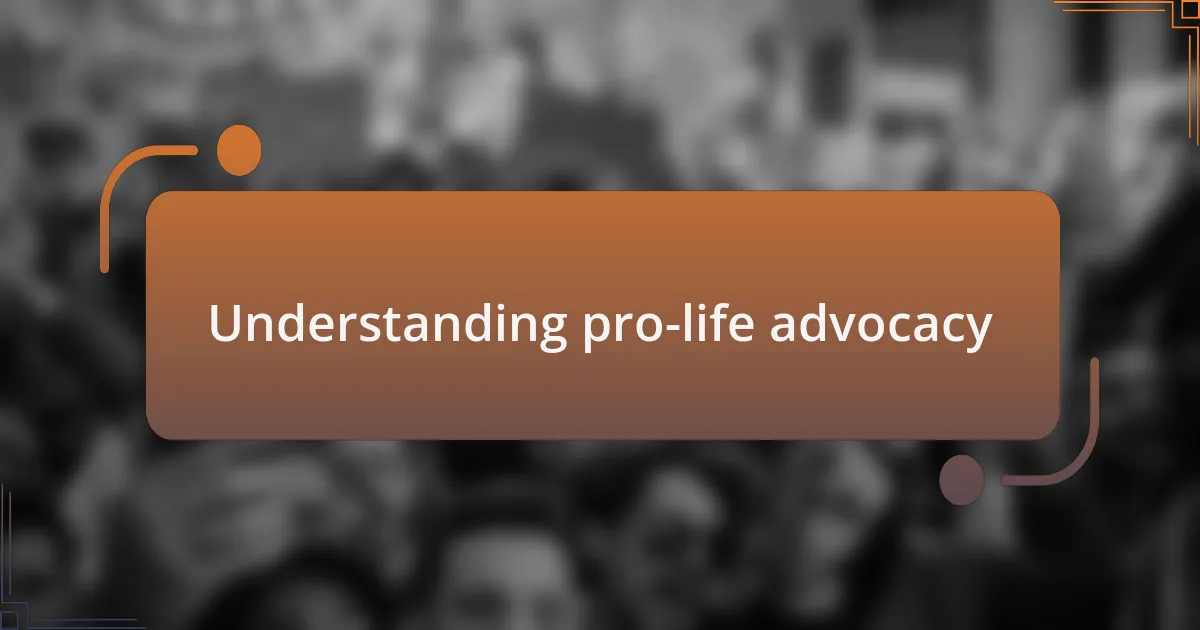
Understanding pro-life advocacy
Pro-life advocacy is about more than just opposing abortion; it’s about fostering a culture that values all human life from conception to natural death. I recall a time when a friend questioned why I hold such firm beliefs. This conversation opened my eyes to the need for compassionate dialogue, prompting me to explain not just my stance but also the deep emotional connections that underlie them.
In my experience, the essence of pro-life advocacy lies in empathy and understanding. I once spoke to a woman who had faced an unplanned pregnancy; her story revealed the fears and struggles many encounter. How can we truly support mothers and their children if we don’t actively listen to these narratives? This made me realize that our advocacy should encompass education, support systems, and access to resources that can help expectant parents choose life.
One of the most profound insights I’ve gained is that pro-life advocacy transcends the political sphere; it’s about community and connection. I remember participating in a local event where families shared their journeys. It was heartwarming to witness tears and laughter mingling together, reminding me that behind the labels are real people facing real challenges. How can we engage with our communities in a way that encourages open conversations about life? This has become a vital question for my own advocacy efforts moving forward.
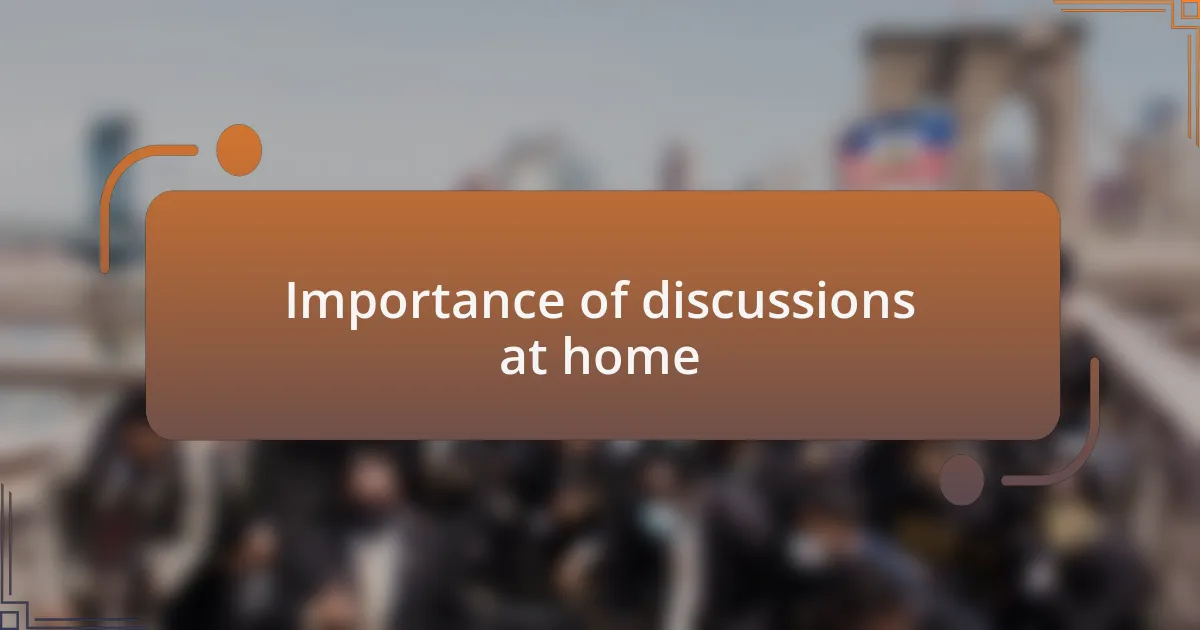
Importance of discussions at home
Discussions at home create a safe space for family members to express their beliefs and feelings about life’s important issues. I remember sitting around the dinner table with my family, where we openly discussed sensitive topics like pro-life values. It was during these moments that I noticed how our conversations not only educated us but also strengthened our family bonds and our shared commitment to supporting life.
Engaging in dialogue at home can help develop critical thinking and empathy. Not long ago, my younger sibling posed a question about a couple’s decision to choose abortion after discovering severe fetal abnormalities. This led to an in-depth discussion on the nuances and complexities of life decisions. I found that answering these hard questions with love and respect fosters an environment where everyone feels valued and understood.
Moreover, building a foundation for these conversations early on can lead to more profound discussions in the future. I’ve seen how my children have grown more compassionate as we navigate difficult subjects together. Do we not have a responsibility to guide the next generation in understanding the sanctity of life? I firmly believe that open dialogues at home can empower them to advocate for life with both passion and respect.
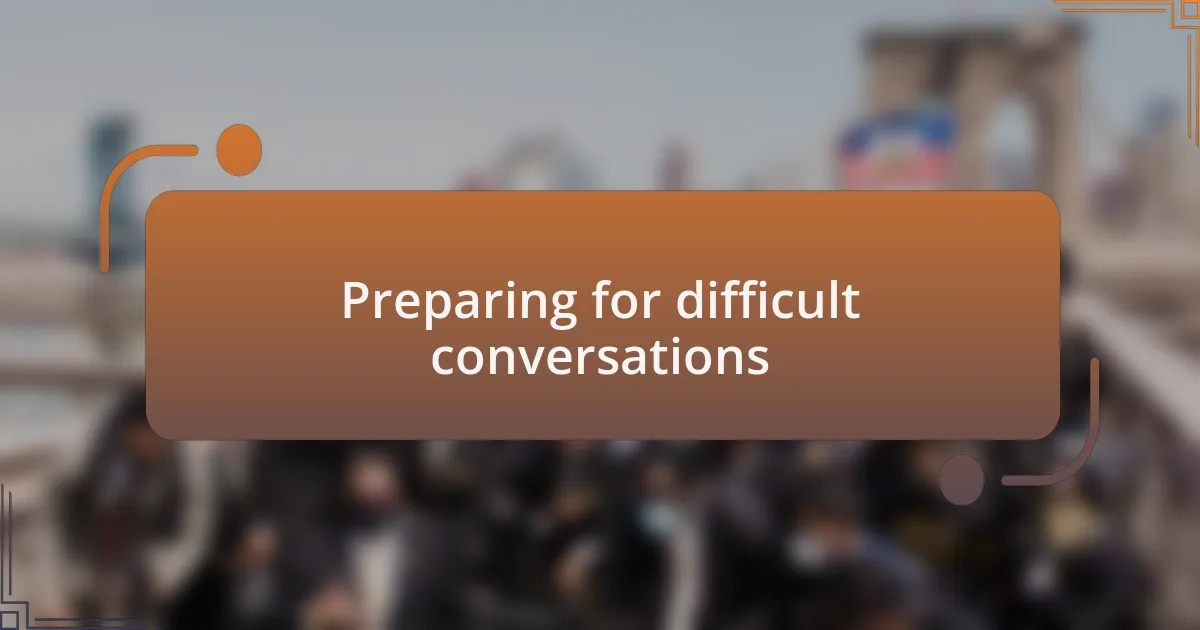
Preparing for difficult conversations
Preparing for difficult conversations requires intentionality and sensitivity. I often reflect on my experiences discussing challenging topics, like the implications of pro-life advocacy. One time, I prepared by jotting down key points I wanted to address, which helped me articulate my thoughts clearly. This preparation allowed me to navigate the conversation with confidence, knowing I had a solid foundation to build upon.
I’ve learned that it’s equally important to listen actively. Before discussing, I seek to understand my family members’ perspectives. I remember having a heartfelt conversation with a close friend who had different views on abortion. Listening to her story helped me grasp her reasoning and made her more receptive to my points. Isn’t it fascinating how empathy can bridge gaps that often seem insurmountable?
Additionally, creating a calm environment can set the tone for these sensitive conversations. I once set aside a cozy evening, with warm drinks and soft lighting, to discuss important values with my teenagers. The relaxed atmosphere encouraged openness and honesty, allowing us to delve into tough subjects without tension. How can we foster that same warmth in our everyday interactions? It all starts with being present and showing we genuinely care about each other’s feelings and thoughts.
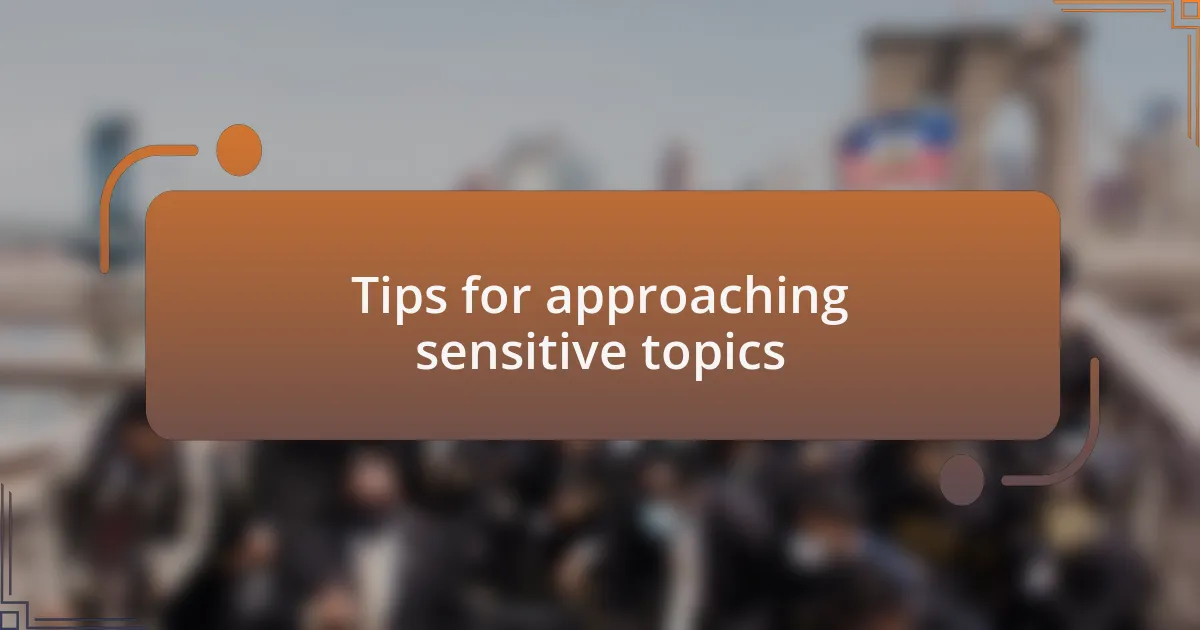
Tips for approaching sensitive topics
When tackling sensitive topics, I find that establishing common ground can profoundly enhance the conversation. I recall a time discussing the ethics of life decisions with my sibling, where we discovered shared values around family and love. By starting from a place of agreement, it opened the door for a more meaningful discussion, making it easier to navigate differences.
Another essential tip is to approach the conversation with an open heart and mind. I once entered a dialogue with my parents about the implications of pro-life policies, fully aware of their opposing views. Instead of preparing to defend my position, I focused on being genuinely curious about their thoughts. This shift in mindset not only reduced defensive reactions, but it also encouraged my parents to be more open to hearing my perspective, enriching the conversation for all of us.
It’s also crucial to keep the tone light even in serious discussions. I remember sharing a lighthearted moment with a friend during a debate about life choices. We briefly laughed at the absurdity of some misconceptions, which diffused tension and reminded us that while the topics are serious, our relationship is more important. How do we keep that balance? By remembering that connection is at the heart of these discussions, we can create safe spaces for dialogue, no matter how difficult the subject may be.
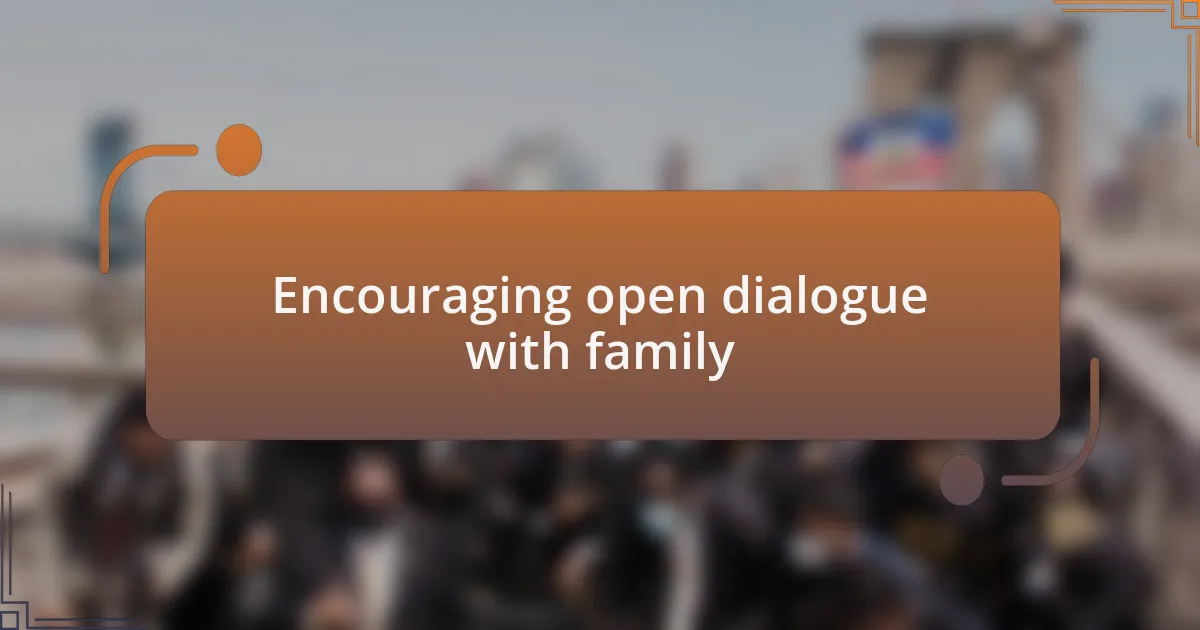
Encouraging open dialogue with family
Open dialogue starts with creating an environment where everyone feels heard and valued. I vividly remember an evening when my family gathered for dinner, and rather than diving straight into serious topics, we shared stories about our experiences with unexpected life events. It was fascinating how sharing personal narratives helped ease any apprehensions, making it clear that each voice mattered in the conversation about our differing beliefs.
When discussing challenging subjects, I believe it’s important to ask questions that invite deeper reflection. For instance, during a family discussion on pro-life perspectives, I posed a question that created space for my brother to express his feelings: “How do you think our personal experiences shape our views on this topic?” I could see his eyes light up, realizing it was safe to open up. This experience taught me that thoughtful questions can spark meaningful exchanges, revealing more than just opinions—they showcase our emotions and experiences.
Lastly, timing can make all the difference in fostering open dialogue. I learned that broaching sensitive topics when everyone is relaxed—like on a quiet Sunday afternoon—allows for more sincere conversations. I remember discussing our differing views on reproductive rights with my parents as we watched a movie together. This informal setting made it easier for all of us to express thoughts without feeling overwhelmed. Have you ever found the right moment to discuss something important? It can truly change the nature of the conversation.
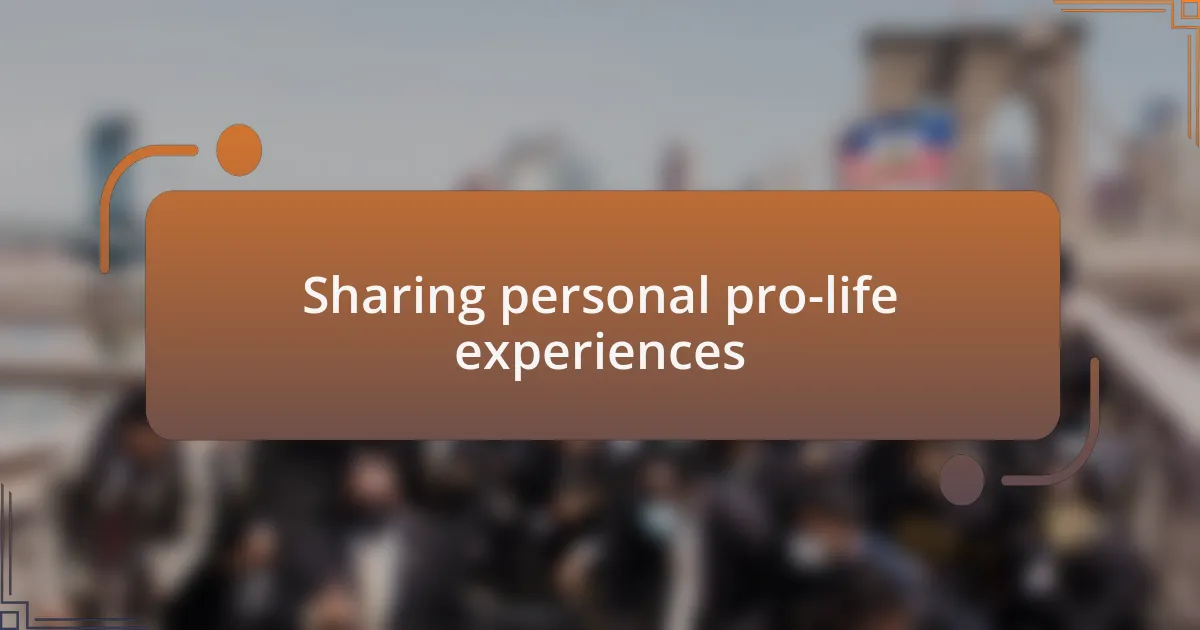
Sharing personal pro-life experiences
Reflecting on my own pro-life journey, I remember a time when I shared my unexpected pregnancy story with my close friends. It was a pivotal moment that revealed not only my fears but also the support I received from those around me. The vulnerability I showed encouraged them to share their own experiences, creating a bond that helped us navigate our diverse perspectives together.
One particularly poignant conversation took place with a relative who had differing views on abortion. I shared how my decision to carry my child to term, despite the challenges, was filled with both joy and anxiety. The raw emotion in that discussion was palpable; it wasn’t just about opinions anymore—it became about life, love, and what it means to support one another through tough times. How often do we miss connecting over shared struggles?
I’ve also found writing about my pro-life experiences to be cathartic. By putting pen to paper, I uncovered layers of my beliefs and emotions that I hadn’t fully processed. Each story was a step toward understanding not just my own stance but also the importance of listening to others’ experiences. Have you ever thought about how sharing your story can be a bridge to understanding? It’s a powerful reminder of our shared humanity and the complex tapestry of life we all contribute to.
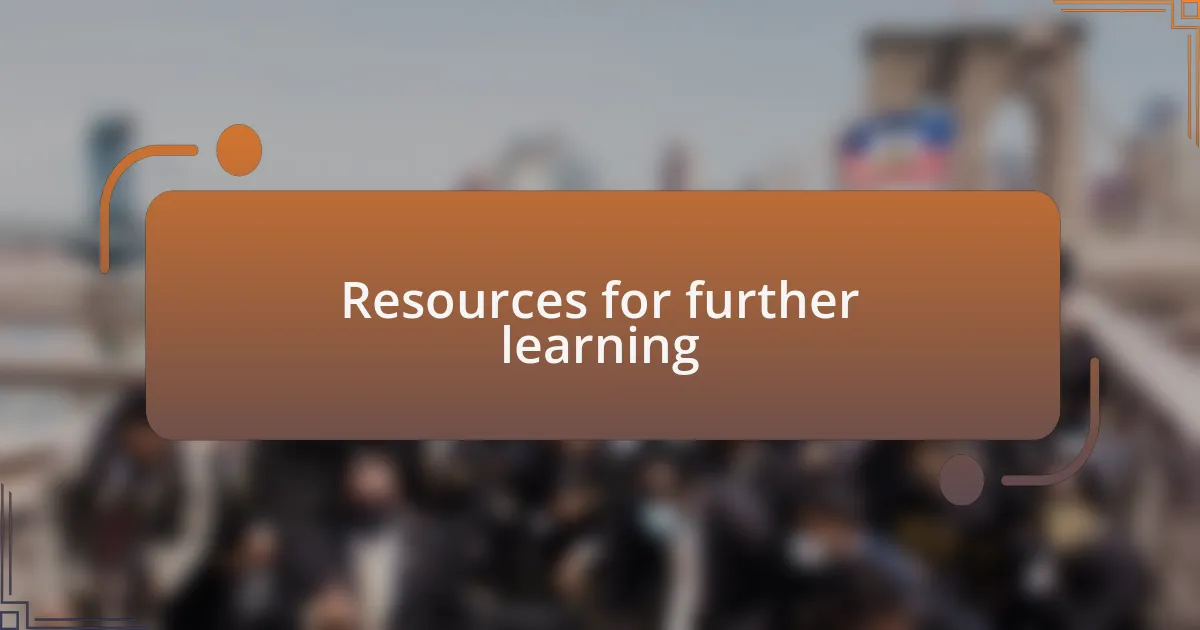
Resources for further learning
When it comes to diving deeper into pro-life advocacy, exploring various resources can be incredibly enlightening. For instance, I stumbled upon several books by authors who share their heartfelt experiences around pregnancy choices. One title that stood out to me was “Unexpected: A Pro-Life Journey” by a mother who documented her emotional rollercoaster. Reading her perspective personally challenged and enriched my understanding of the complexities that come with such decisions. Have you considered how the stories of others can reshape your viewpoints?
Documentaries can also serve as powerful tools for learning. I vividly remember watching “The Choice” which gave voices to both sides of the abortion debate, illuminating the emotional weight carried by everyone involved. The gripping narratives left me reflecting on my beliefs long after the credits rolled. How often do we pause to absorb the multifaceted aspects of difficult choices like these?
Online platforms are another fantastic avenue to broaden your knowledge. I frequently visit pro-life websites and forums where individuals share their journeys and insights. There’s something truly enlightening about reading personal blog posts filled with raw truth. Engaging with these stories has often led me to question my assumptions and sparked meaningful conversations with like-minded individuals. Are you ready to delve deeper into these discussions, noticing how each voice contributes to the larger conversation?